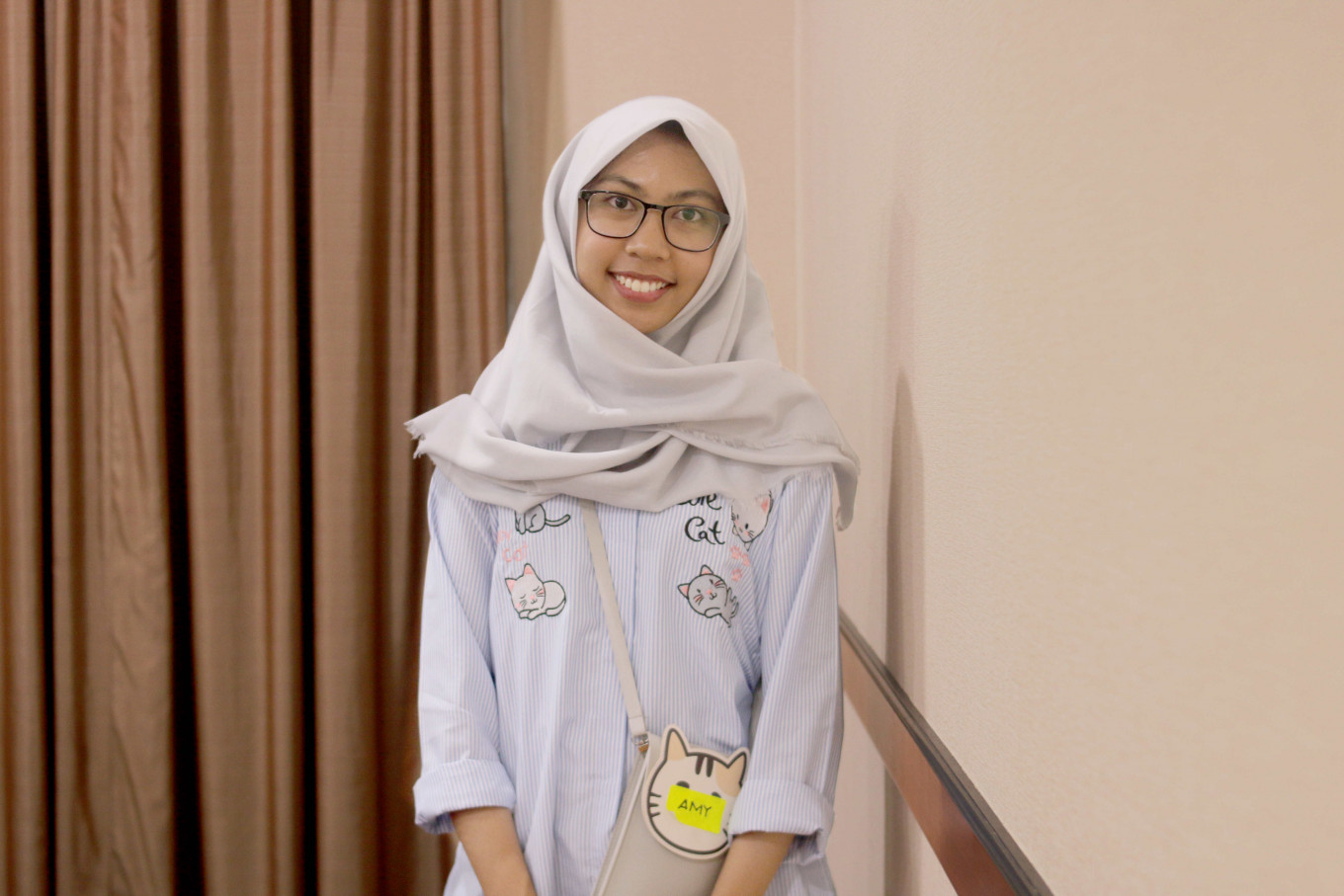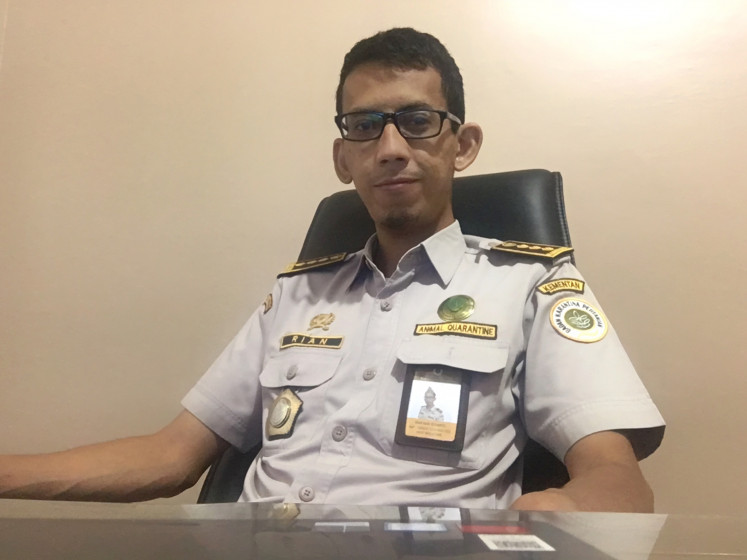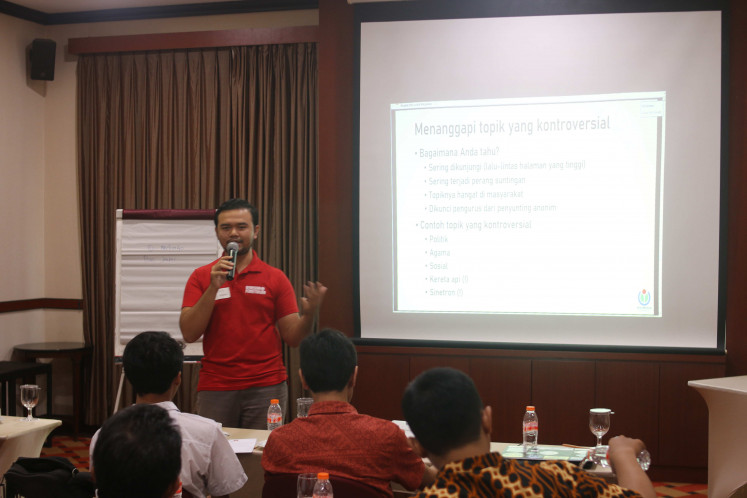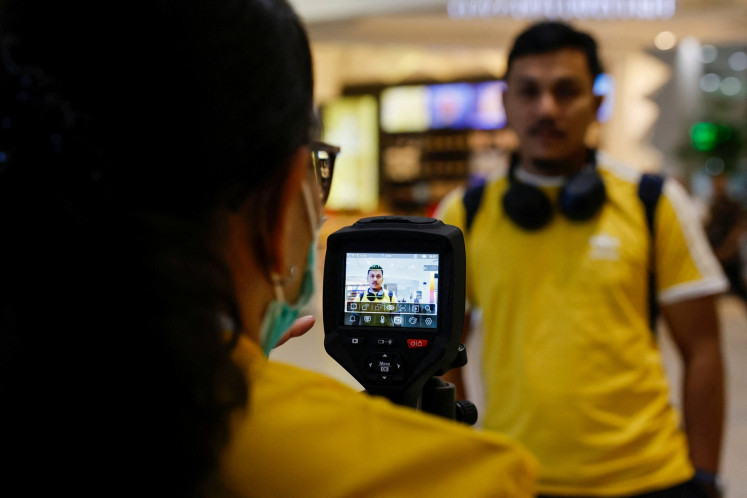Popular Reads
Top Results
Can't find what you're looking for?
View all search resultsPopular Reads
Top Results
Can't find what you're looking for?
View all search resultsPassion for information: Wikipedia contributors share what goes on behind the scenes
From getting persecuted to solving the gender gap, we learn how five Wikipedia editors struggle to manage, arguably, the most prominent encyclopedia of our generation.
Change text size
Gift Premium Articles
to Anyone
A 26-year old who goes by the pseudonym Nohirara, which means “falling in love” in Central Sulawesi’s local language, remembers clearly how he was introduced to Wikipedia Bahasa Indonesia. Choosing only to use his Wikipedia username and not his given name, Nohirara, who works for a digital comic publisher, takes The Jakarta Post back to his high school days, six years ago. His history teacher had asked the class to write a paper about Indonesia’s rule under the Dutch East India Company (VOC) during the colonial era. He knew that there were books in the school library that would help his research, but limited in quantity, all those books had been rented out. Seeing Nohirara uneasy about the situation, a friend told him about this site containing “nearly everything” called Wikipedia Bahasa Indonesia, the Indonesian version of Wikipedia.
“I copy-pasted the whole page and submitted it. My teacher didn’t know [I was cheating], so I got a good grade,” he laughed.
The next day, driven by curiosity, he returned to Wikipedia and found that anyone could edit the pages. From that day on, Nohirara spent his recess on the library’s computer, editing Wikipedia pages. Today, he is one of the website’s administrators and manages Wikipedia Bahasa Indonesia’s Twitter account. An administrator can delete or protect (ensuring no malicious edits are made) articles and ban problematic accounts.
One of the most popular websites in existence (it was ranked the fifth-most visited website globally as of January 2021 with 6.1 billion monthly visitors), Wikipedia is powered by a community that shares a passion for information; it has served as a lot of people as the first stop for general information since its launch in 2001. Wikipedia Bahasa Indonesia launched in 2003.
“Benny Lin” (also using his Wikipedia username), a then-17-year-old Indonesian living in the United States (he is now 36), was one of the first “Wikipediawan” – a term Indonesians use for local Wikipedia editors. He remains an active editor.
“Wikipedia [Bahasa Indonesia] challenged me to be able to write and edit in formal Indonesian. As an Indonesian living abroad, it made me realize I was not that good at writing in my mother tongue,” said Benny. In his early contributions, Benny wrote about musical instruments, history and anything he could translate – often until ten at night using the computer at the university’s library.
Majoring in Computer Science, Benny helped develop the early stages of Wikipedia Bahasa Indonesia’s user interface, such as the categorization’s feature or the formatting template. Thanks to his work, a then-third grader, Ramzy from Pekanbaru, was able to navigate his way on the website quickly, sometime in 2007.
“It was all about soccer articles in the beginning. Slowly but surely, I (worked on) history, politics, law, film and pop culture,” said Ramzy Muliawan, now a 22-year-old law student at Andalas University in West Sumatra. In 2013, he was nominated as an administrator.
#BoikotWikipedia campaign
In 2020, a viral #BoikotWikipedia (boycott Wikipedia) hashtag made the editors fear for their safety.
In June 2020, a group of unidentified people on the internet began the campaign, utilizing threatening language, because they were not happy with the way Wikipedia wrote about the Indonesian Communist Party (PKI) and the massacre of 1965. “They think we were presenting inaccurate information, because it did not match the official history narrative of the government,” said Ramzy. “The weird thing is, it was only Wikipedia Bahasa Indonesia they were campaigning to boycott, not Wikipedia English, where they could clearly see that the story [there] is more antigovernment than ours.”
The impact was huge for the local Wikipedia community. “Many of my friends were persecuted online,” said Nohirara. “Those people even tried to find personal information about the contributors involved in the article and sent threats.”
“Thank God, there was no ‘real’ violence. After that, we learned to separate our online presence from our real identity,” said Benny. Ramzy even changed his username.
Despite the turmoil, Hari “Rian” Suharto still uses his real name on the site. As a veterinarian working at the Ministry of Agriculture in South Sulawesi, the 32-year-old has a mission in mind. “One problem I want to solve regarding Wikipedia (Bahasa Indonesia) is its lack of expert contributors. I use my real name and write about something I’ve deeply learned about to inspire other experts to do the same.”
Rian, who just got promoted as an administrator a month ago, was the first to create the Wikipedia Bahasa Indonesia page about COVID-19 last year.
Wikipedia and women
Rahmi has been working at Wikimedia Indonesia since 2018, a host institution that is officially part of Wikipedia Bahasa Indonesia. The 25-years-old woman works day-to-day as an educational program coordinator.
“Wikimedia often holds writing and editing training courses, we need more people, because contributors are the backbone of Wikipedia,” said Rahmi. It is a challenge, because contributors, both administrators and supervisors, are nonpaid positions.
Another big challenge for Rahmi, Benny and everyone in the Wikipedia community is how to get more women involved.
“A woman finally joined us [as an administrator] last year,” Benny said, after nearly 16 years of all-male administrators. Benny shares part of the blame on history.
“At Encyclopedia Britannica, the editors are hundred percent men. (History tells) us that writing and editing is a men-only type of job, but now we are trying our best to [close] the gap.” The problem also occurs globally. According to a 2018 survey by Wikimedia, only 8 percent of global Wikipedia contributors are women.
One of their efforts is the Wikigap program, which trains women to write about women-related articles. Wikigap has been held four times: in Yogyakarta (2018), Padang (2018), Bandung (2019) and as a webinar format (2021), with 30 to 40 participants in each session.
Wikimedia also has an Indonesia-exclusive monitoring program called Wikisedaya to supervise the women they’ve trained.
Benny tries to do his part by sharing Wikipedia articles that anyone can relate to. “I try to attract more women readers in the hope that it will encourage them to edit on the site,” Benny said.
As of March 18th, 2021, Wikipedia Bahasa Indonesia has 1.2 million users, 2,093 active users, 38 administrators and 564.044 articles.
Not surprisingly, “Many people write about themselves in Wikipedia, even though most of them are not qualified for an article; bureaucrats and businesspeople even often ‘order’ articles about themselves,” said Ramzy, when asked about some memorable moments taking care of the site. He mentioned that you have to be in three credible sources —book, journal, media— to have your own Wikipedia page.
He laughs, recalling one particularly heated exchange among editors. “We had a good debate in 2014 to decide whether or not we should make an article for each member of girl band JKT48.”













